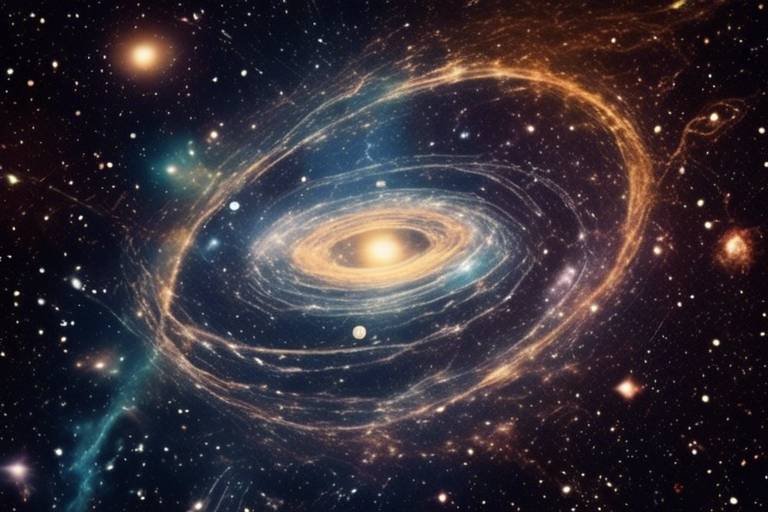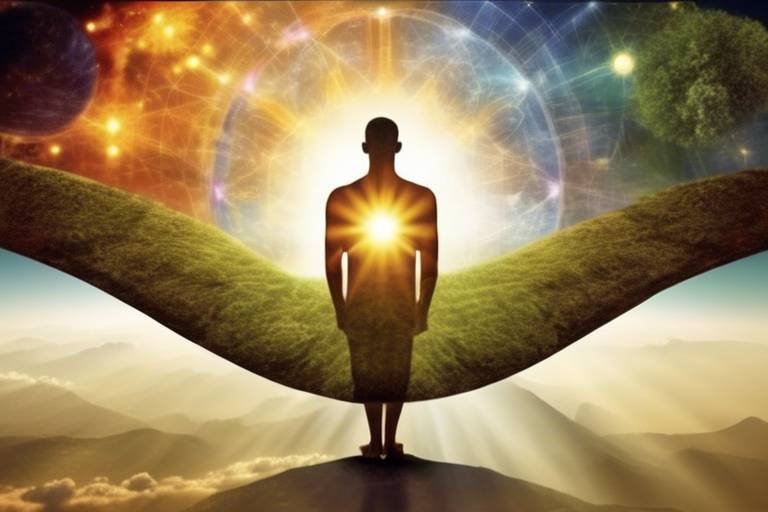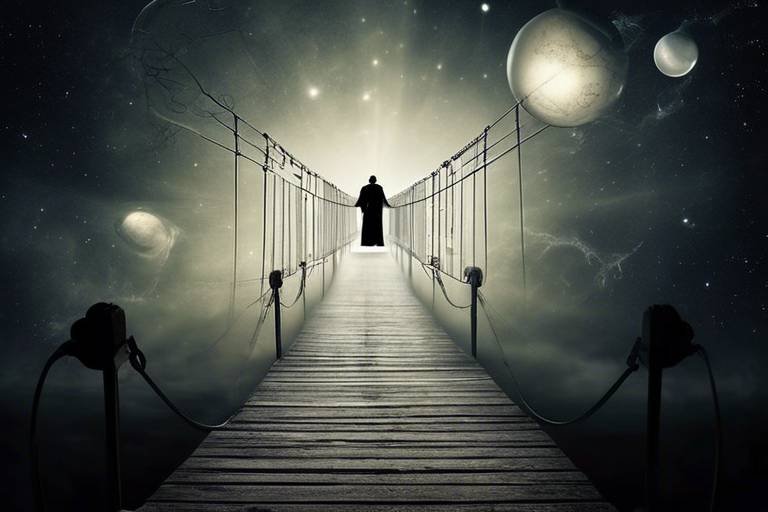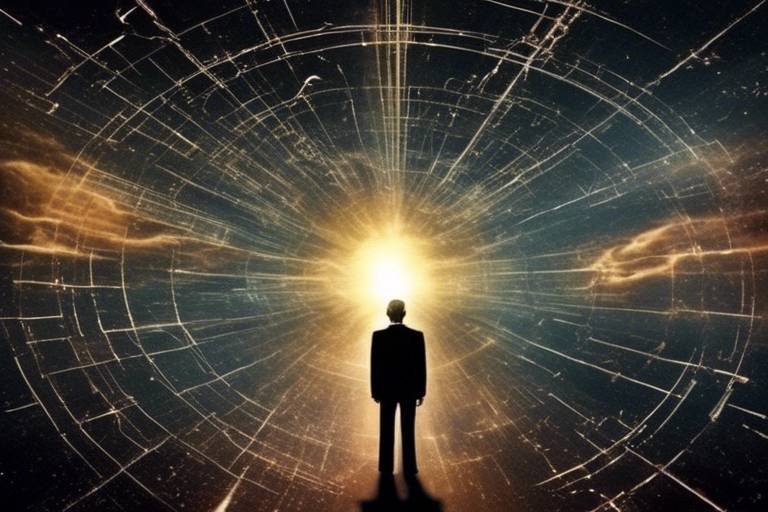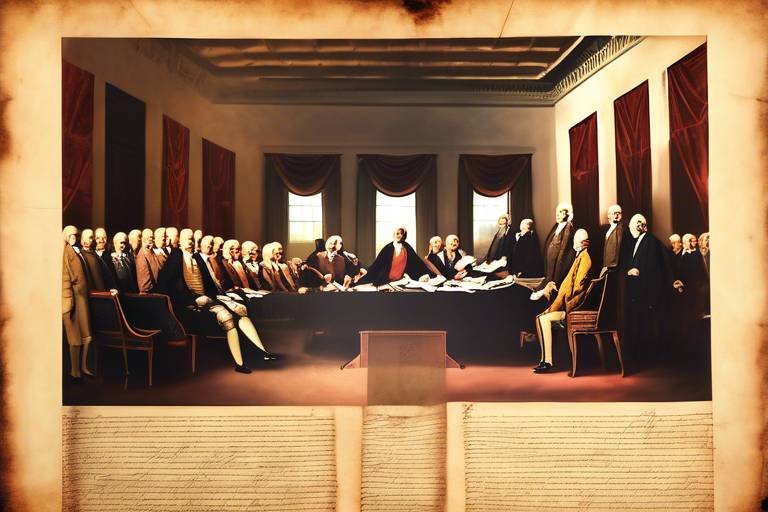Is Our Universe Deterministic? A Metaphysical Exploration
Have you ever gazed up at the stars and wondered if everything around you is set in stone? The debate surrounding whether our universe is deterministic—meaning every event or action is preordained by preceding events and natural laws—has captivated philosophers, scientists, and curious minds alike for centuries. In this exploration, we will dive deep into the philosophical implications of determinism, examining various perspectives and theories that challenge or support the idea of a predetermined reality. This journey will take us from ancient philosophical thought to the cutting-edge realms of quantum mechanics, where uncertainty reigns and the very fabric of reality seems to unravel.
To embark on this metaphysical journey, it’s essential to grasp the concept of determinism itself. At its core, determinism posits that every event, including human actions, is the result of preceding events governed by the laws of nature. This notion has historical roots that trace back to thinkers like Baruch Spinoza and David Hume, who contributed significantly to the discourse. Spinoza, for instance, argued that everything in the universe is interconnected, and thus, everything unfolds according to a divine, rational plan. Hume, on the other hand, introduced skepticism, questioning whether we can truly claim to understand the causal relationships that dictate our lives. These early discussions set the stage for a rich tapestry of thought surrounding determinism, influencing countless philosophers and scientists over the ages.
Fast forward to the 20th century, and we encounter the revolutionary field of quantum mechanics, which throws a wrench into the classical understanding of determinism. Unlike the predictable motions of planets or the trajectory of a thrown ball, quantum phenomena introduce a level of uncertainty that challenges the very foundation of deterministic thought. For instance, the famous double-slit experiment demonstrates how particles can behave both as waves and particles, leading to outcomes that seem fundamentally random. This raises profound questions: If the universe operates on principles of chance at the quantum level, what does that mean for our understanding of reality? Are we merely products of a chaotic system, or is there an underlying order that we fail to perceive?
In quantum mechanics, probability is not just a tool; it’s a fundamental aspect of the universe. When we measure a quantum particle, we don’t get a definitive answer. Instead, we receive a range of possible outcomes, each with a certain probability. This probabilistic nature of reality begs the question: does randomness undermine determinism? Or could it suggest that determinism exists on a different level, one that we are not yet capable of fully understanding? The philosophical implications are staggering, as they challenge our perceptions of causality and the predictability of our universe.
This tension between randomness and determinism is a central theme in contemporary discourse. On one side, proponents of determinism argue that what we perceive as random could merely be a reflection of our ignorance regarding the underlying laws governing those events. They assert that if we had complete knowledge of all variables, we could predict every outcome. Conversely, advocates for indeterminism contend that true randomness exists, suggesting that some events occur without any deterministic cause. This ongoing debate raises critical questions: Is the universe a grand clockwork machine, or is it a chaotic symphony of chance?
The relationship between determinism and free will is one of the most hotly debated topics in philosophy. If our actions are predetermined, can we genuinely claim to have free will? This conundrum has led to various interpretations of human agency. Compatibilists argue that free will and determinism can coexist, suggesting that even if our choices are influenced by prior events, we still have the capacity to make decisions. In contrast, incompatibilists maintain that true free will cannot exist in a deterministic universe, while libertarians advocate for a version of free will that is entirely independent of deterministic laws. Each perspective offers a unique lens through which to view human action, responsibility, and morality.
As we delve deeper into the philosophical perspectives surrounding determinism, it's clear that this issue is far from settled. Compatibilism, incompatibilism, and libertarianism each provide compelling arguments that shape our understanding of free will in a deterministic universe. Compatibilists, like Daniel Dennett, argue that we can maintain moral responsibility even in a deterministic framework, as our intentions and desires guide our actions. In contrast, incompatibilists, such as Peter van Inwagen, challenge the very notion of moral responsibility if our actions are predetermined. Libertarians, including Robert Kane, advocate for a more radical view, positing that individuals have the power to make choices that are not bound by prior events. This rich tapestry of thought emphasizes the complexity of the determinism debate and its implications for our understanding of existence.
To further enrich our exploration, we must distinguish between scientific and philosophical determinism. Scientific determinism suggests that the universe operates under fixed laws that can be understood and predicted, leading to the conclusion that everything is predetermined. In contrast, philosophical determinism delves deeper into the implications of such a worldview, questioning how it affects our understanding of existence and choice. While scientific determinism focuses on observable phenomena, philosophical determinism grapples with the moral and existential dilemmas that arise from the idea that our choices may not be as free as we believe.
Examining the historical roots of determinism provides valuable context for our discussion. From the ancient philosophies of Aristotle to the mechanistic worldview of Isaac Newton, the evolution of deterministic thought reflects humanity's quest to understand the universe. In the 19th century, the rise of Laplace's Demon illustrated the pinnacle of scientific determinism, suggesting that if one could know the positions and velocities of all particles in the universe, they could predict the future. However, the advent of quantum mechanics in the 20th century shattered this deterministic ideal, leading to a reevaluation of our understanding of reality.
Today, the debates surrounding determinism remain vibrant and ongoing. Contemporary thinkers like Sam Harris and Alfred Mele contribute to the discourse, reflecting on how advancements in science and philosophy continue to shape our understanding of determinism. As we stand on the brink of new discoveries, the question remains: is our universe deterministic, or is it a complex interplay of chance and choice? The answers may not only redefine our understanding of reality but also our place within it.
- What is determinism? Determinism is the philosophical belief that all events, including human actions, are determined by preceding events in accordance with the natural laws.
- How does quantum mechanics relate to determinism? Quantum mechanics introduces uncertainty and randomness into the discussion, challenging classical deterministic views.
- Can free will exist in a deterministic universe? This is a central debate in philosophy, with various perspectives arguing for and against the coexistence of free will and determinism.
- What are the main philosophical perspectives on determinism? Key viewpoints include compatibilism, incompatibilism, and libertarianism, each interpreting the nature of free will differently.

The Concept of Determinism
When we dive into the vast ocean of philosophy, the concept of determinism often surfaces as a buoyant topic, raising waves of inquiry and debate. At its core, determinism posits that every event, including human actions, is determined by preceding events in accordance with the natural laws. Imagine a grand cosmic domino effect where each piece falls perfectly into place, guided by the unyielding hand of causality. This idea suggests that everything we experience is the result of prior states of affairs, leaving little room for chance or randomness.
Historically, determinism has been a cornerstone of philosophical thought, with roots tracing back to ancient civilizations. Notable philosophers, such as Baruch Spinoza and David Hume, have contributed significantly to the discourse. Spinoza, for instance, argued that everything in the universe is interconnected and follows a predetermined path, while Hume introduced skepticism about causation, questioning whether we can truly claim to understand the mechanics behind our experiences. These early discussions set the stage for a rich tapestry of ideas that would evolve over the centuries.
As we sift through the sands of time, we encounter different flavors of determinism. There’s scientific determinism, which aligns with the principles of physics, asserting that if we had complete knowledge of the universe's state at any given moment, we could predict all future states. On the other hand, philosophical determinism delves deeper into the implications of free will and moral responsibility. This distinction is crucial because it shapes how we interpret our choices and the nature of our existence.
To better understand the nuances of determinism, let's highlight some key points:
- Definition: The belief that every event or state of affairs is the outcome of preceding events in accordance with fixed laws.
- Historical Figures: Philosophers like Spinoza and Hume have laid the groundwork for our understanding of determinism.
- Types of Determinism: Scientific vs. philosophical, each offering different perspectives on causality and free will.
As we navigate through this philosophical landscape, we must also consider the implications of determinism on our daily lives. If everything is predetermined, what does that mean for our sense of agency? Are we merely actors in a play, following a script written long before our time? These questions not only stir curiosity but also challenge our understanding of personal responsibility and moral accountability.
In conclusion, the concept of determinism is not just a dry philosophical doctrine; it is a living, breathing idea that influences how we perceive reality. It invites us to examine our beliefs about choice, responsibility, and the very fabric of existence. As we continue this exploration, we will uncover how determinism interacts with the enigmatic world of quantum mechanics, further complicating our understanding of reality.

Quantum Mechanics and Indeterminism
When we dive into the world of quantum mechanics, we enter a realm that seems to defy our classical understanding of the universe. It's like stepping into a surreal painting where the rules of reality twist and turn in unexpected ways. At its core, quantum mechanics introduces a fundamental level of uncertainty that challenges the very notion of determinism. Unlike the predictable orbits of planets or the straightforward trajectory of a thrown ball, quantum particles behave in ways that can only be described in terms of probabilities.
One of the most intriguing aspects of quantum mechanics is the concept of superposition. Imagine a coin that is both heads and tails at the same time until you flip it. This idea suggests that particles can exist in multiple states simultaneously, only collapsing into a single state when observed. This phenomenon raises profound questions: If particles can exist in a state of uncertainty, what does that mean for the deterministic framework we often apply to larger systems?
Moreover, the observer effect further complicates our understanding. In quantum mechanics, the act of observation can influence the state of a particle. This leads to a fascinating paradox: is reality shaped by our consciousness? Or is it merely an illusion of our limited perception? These questions evoke a sense of wonder and uncertainty, pushing us to rethink the very fabric of reality.
To illustrate the contrast between classical determinism and quantum indeterminism, consider the following table:
| Aspect | Classical Mechanics | Quantum Mechanics |
|---|---|---|
| Nature of Reality | Deterministic | Indeterministic |
| State of Particles | Well-defined | Probabilistic |
| Influence of Observation | No effect | Alters states |
This table exemplifies the stark contrast between the two frameworks. In classical mechanics, if you know the initial conditions of a system, you can predict its future states with absolute certainty. However, quantum mechanics throws a wrench in this predictability, introducing a degree of randomness that is both fascinating and perplexing.
As we explore the implications of quantum indeterminism, we must also consider the role of probability. In the quantum realm, the outcomes of experiments are often expressed as probabilities rather than certainties. For instance, when measuring the position of an electron, we can only predict where it is likely to be found, not where it definitively is. This probabilistic nature of quantum mechanics leads to a fundamental shift in how we understand causality and the flow of time.
Ultimately, the interplay between randomness and determinism in quantum mechanics creates a rich tapestry of philosophical inquiry. Does true randomness exist, or is it simply a reflection of our ignorance about underlying deterministic processes? This question is at the heart of ongoing debates in both scientific and philosophical circles.
As we navigate this complex landscape, we must also consider the implications for our understanding of free will. If our universe is fundamentally indeterministic, does that grant us a form of freedom that classical determinism denies? Or does it merely complicate our understanding of choice and agency? These questions linger in the air, inviting us to ponder the nature of our existence in a universe that may not be as predictable as we once thought.
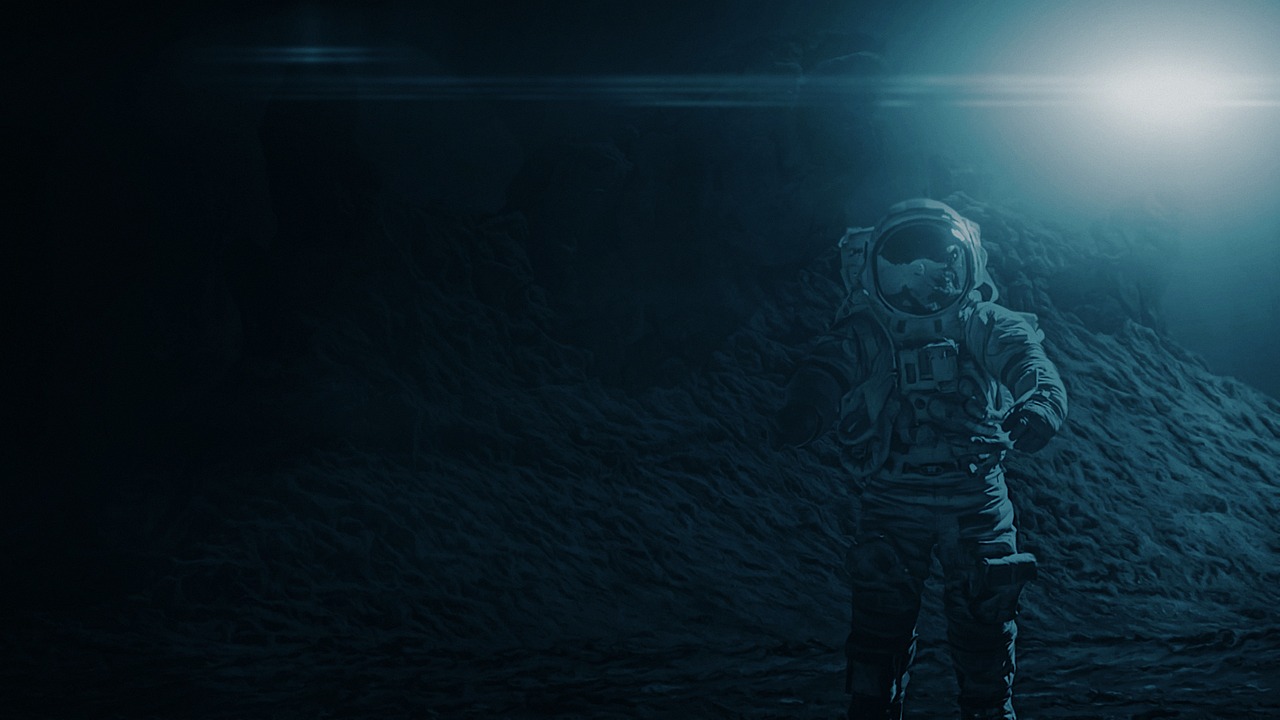
The Role of Probability
When we dive into the realm of quantum mechanics, one of the most intriguing concepts that emerges is probability. Unlike classical physics, where outcomes can be predicted with certainty, quantum mechanics introduces a layer of uncertainty that fundamentally reshapes our understanding of the universe. Imagine flipping a coin; while we know there are two possible outcomes, the actual result is uncertain until the coin lands. This analogy captures the essence of how probability operates in quantum phenomena.
In quantum mechanics, particles do not have definite states until they are observed. Instead, they exist in a superposition of states, each with its own probability. This means that rather than saying a particle is in one specific location, we can only speak in terms of likelihoods. For instance, the famous double-slit experiment illustrates this beautifully: when particles pass through two slits, they create an interference pattern that suggests they behave like waves, existing in multiple states simultaneously until measured. This challenges our classical intuitions and raises profound questions about reality.
To understand the implications of probability in quantum mechanics, consider the following key points:
- Uncertainty Principle: Introduced by Werner Heisenberg, this principle states that certain pairs of physical properties, like position and momentum, cannot be simultaneously known to arbitrary precision. This inherent uncertainty forces us to accept that probability is a fundamental aspect of nature.
- Wave Function Collapse: Before observation, a quantum system is described by a wave function that encompasses all possible states. Upon measurement, this wave function collapses to a single outcome, illustrating how probability plays a critical role in determining reality.
- Randomness in Quantum Events: Unlike classical events that can often be predicted, quantum events appear to be truly random. This randomness challenges deterministic views and suggests that, at a fundamental level, the universe may not follow strict cause-and-effect rules.
As we explore the philosophical ramifications of these probabilistic outcomes, questions arise: If outcomes are fundamentally probabilistic, what does that mean for our understanding of determinism? Does the presence of chance imply that the universe is chaotic, or could it coexist with a deterministic framework? These questions lead us to consider the nature of reality itself and how we interpret events in our lives.
Moreover, probability doesn’t just affect the microscopic world; it permeates our daily experiences. Think about the weather forecast. Meteorologists use probability to predict whether it will rain tomorrow, often stating there’s a 70% chance of rain. While this information guides our decisions, it also highlights the inherent uncertainty in predicting future events. Just as we rely on probabilities in our daily lives, scientists must grapple with these concepts when studying the universe.
In summary, the role of probability in quantum mechanics not only challenges classical determinism but also prompts us to rethink our understanding of reality. As we continue to explore the universe's workings, we must embrace the uncertainty that comes with it. After all, isn’t life itself a series of probabilities, where each decision leads us down a path filled with potential outcomes?
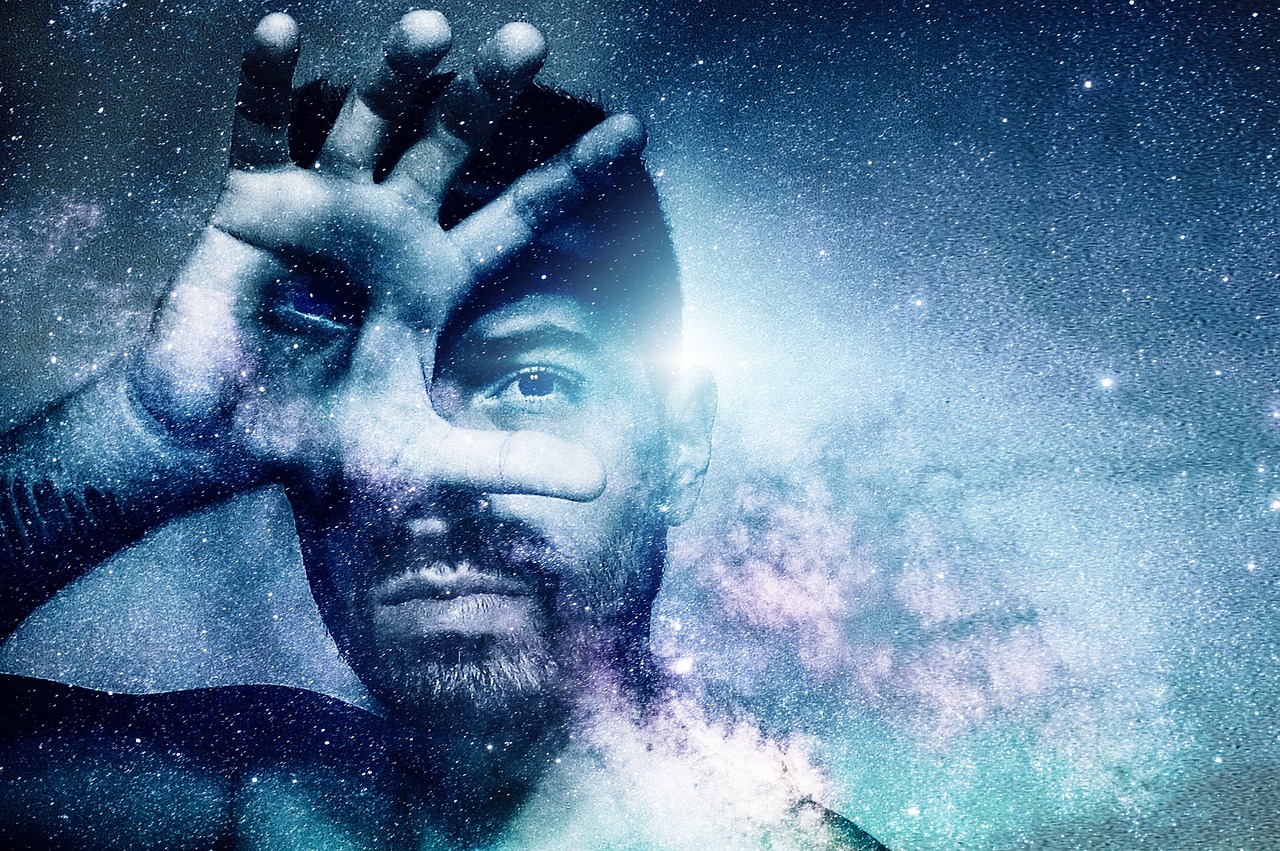
Randomness vs. Determinism
When we dive into the debate of randomness versus determinism, we find ourselves in a fascinating tug-of-war between two seemingly opposing forces. Imagine a grand cosmic chess game where every piece moves according to strict rules—this is determinism. Now, picture a chaotic carnival where dice are rolled, and outcomes are unpredictable—this embodies randomness. The question arises: can both coexist, or does one ultimately overshadow the other?
Determinism posits that every event in the universe is the result of preceding events, governed by natural laws. This perspective suggests that if we had complete knowledge of the initial conditions of the universe, we could predict every future event with absolute certainty. However, the advent of quantum mechanics has thrown a wrench into this neat picture. At the quantum level, particles behave in ways that seem fundamentally random. For instance, the decay of a radioactive atom is not something we can predict; we can only assign probabilities to when it might happen. This uncertainty challenges the classical deterministic view and introduces a layer of complexity that philosophers and scientists alike grapple with.
To better understand this tension, let’s consider the following points:
- True Randomness: Is it possible that randomness exists as a fundamental aspect of reality? Some argue that quantum events are genuinely random, not just a reflection of our ignorance.
- Hidden Variables: Others propose that there might be hidden variables we are not yet aware of, which could account for the apparent randomness, thus preserving a deterministic framework.
- Philosophical Implications: The coexistence of randomness and determinism raises profound questions about the nature of reality and our place within it. If events can be random, what does that mean for our understanding of causality?
In this ongoing debate, we must also consider how randomness might not be as chaotic as it seems. Just as a river flows with unpredictable twists and turns, yet adheres to the laws of physics, perhaps our universe operates similarly. The apparent randomness could be the universe's way of expressing complexity within a deterministic framework. This perspective invites us to reconsider the nature of free will and moral responsibility, as we ponder whether our choices are genuinely free or merely the products of a complex interplay of deterministic laws and random events.
Ultimately, the relationship between randomness and determinism is not a simple dichotomy. It’s more like a dance—sometimes leading, sometimes following. As we explore this intricate relationship, we are reminded that the universe is far more complex than we often perceive. The interplay of these concepts invites us to question our understanding of existence itself, urging us to embrace the mystery that lies at the heart of reality.
- What is determinism? Determinism is the philosophical belief that all events, including moral choices, are determined completely by previously existing causes.
- How does quantum mechanics challenge determinism? Quantum mechanics introduces elements of probability and uncertainty, suggesting that not all events are predetermined.
- Can randomness and determinism coexist? Yes, some theories propose that randomness may exist within a deterministic framework, creating a complex interplay between the two.
- What are the implications of this debate on free will? The discussion raises questions about whether our choices are truly free or influenced by deterministic laws and random events.
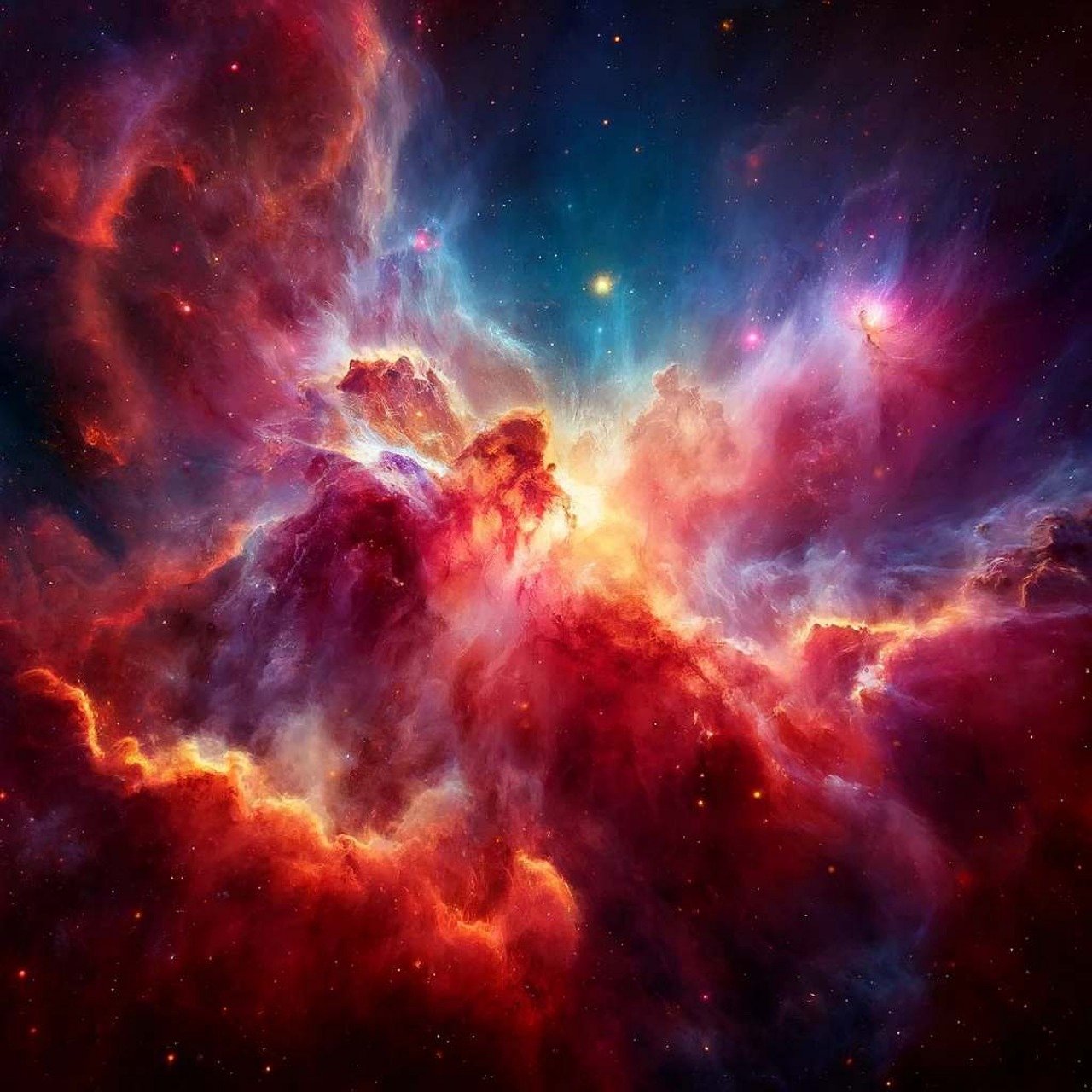
Implications for Free Will
The debate surrounding determinism inevitably leads us to the intriguing question of free will. If our universe operates under fixed laws, can we truly claim that we have the freedom to make choices? This dilemma has perplexed philosophers for centuries and continues to stir passionate discussions today. The implications of determinism on free will can be viewed through various lenses, each bringing forth unique perspectives and challenges.
At its core, the concept of free will suggests that individuals have the power to make choices that are not entirely dictated by external forces. However, if determinism holds true, it implies that every choice we make is the result of preceding events and conditions, potentially stripping away our sense of autonomy. Imagine a puppet show where the puppeteer pulls the strings—every movement, every decision of the puppet is predetermined by the puppeteer's will. This metaphor illustrates the conflict between the two concepts.
One of the most profound implications of this debate is the impact on moral responsibility. If our actions are predetermined, can we truly be held accountable for them? This question raises further inquiries into justice and ethics. For instance, if a person commits a crime due to a series of predetermined events leading to that moment, should they be punished in the same way as someone who made a conscious choice to act against the law? The legal and moral frameworks we rely on may need to adapt if determinism is proven to be a fundamental truth of our existence.
Philosophers have developed different positions in response to this dilemma. Compatibilists argue that free will is compatible with determinism, suggesting that even if our choices are influenced by prior events, we can still act freely as long as our actions align with our desires and intentions. On the other hand, incompatibilists believe that if determinism is true, then free will cannot exist, leading to a more fatalistic view of human behavior. Lastly, libertarians (not to be confused with the political ideology) assert that we do possess free will, and that determinism is false, advocating for a reality where individuals can genuinely choose their paths.
To further illustrate these viewpoints, consider the following table that summarizes the key positions on free will in relation to determinism:
| Philosophical Position | View on Free Will | View on Determinism |
|---|---|---|
| Compatibilism | Free will exists within deterministic frameworks | Accepts determinism |
| Incompatibilism | Free will cannot exist if determinism is true | Rejects determinism |
| Libertarianism | Free will is real and determinism is false | Rejects determinism |
Ultimately, the implications of determinism on free will compel us to reflect on our understanding of human nature and existence. Are we mere products of our environment, or do we possess the ability to carve our own destinies? This philosophical inquiry remains open-ended, inviting us to explore the depths of our consciousness and the nature of the universe itself, much like a vast ocean of possibilities where each wave represents a choice waiting to be made.
- What is determinism? Determinism is the philosophical belief that all events, including human actions, are determined by preceding causes and conditions.
- Can free will exist in a deterministic universe? This is a contentious issue; some argue that free will can coexist with determinism (compatibilism), while others believe they are mutually exclusive (incompatibilism).
- What are the implications of determinism for moral responsibility? If our actions are predetermined, it raises questions about accountability and whether individuals can be justly punished for their actions.

Philosophical Perspectives
The debate surrounding determinism is rich and complex, with various philosophical perspectives offering unique insights into the nature of reality and free will. At the heart of this discussion are three primary viewpoints: compatibilism, incompatibilism, and libertarianism. Each of these philosophies provides a different lens through which to examine the relationship between determinism and human agency, ultimately shaping our understanding of moral responsibility and choice.
Compatibilism posits that determinism and free will are not mutually exclusive. Compatibilists argue that even if our actions are determined by prior states of the universe, we can still possess free will if we act according to our desires and intentions. In this view, freedom is defined not as the absence of causation but as the ability to act in accordance with one's motivations. This perspective can be likened to a river flowing within its banks; while the river's course is predetermined by the landscape, it still has the freedom to navigate within those boundaries. Thinkers like David Hume and Daniel Dennett have championed this view, suggesting that moral responsibility can exist even in a deterministic framework.
On the other hand, incompatibilism asserts that if determinism is true, then free will cannot exist. Incompatibilists argue that true freedom requires the ability to have acted differently in a given situation, a condition that deterministic laws inherently deny. This perspective raises profound questions about moral accountability: if our choices are predetermined, can we truly be held responsible for our actions? Philosophers such as Immanuel Kant and Peter van Inwagen have explored these ideas, emphasizing the implications of a deterministic universe on our understanding of ethics and justice.
Lastly, libertarianism (not to be confused with the political ideology) offers a robust defense of free will, arguing that humans possess the capacity to make genuinely free choices that are not determined by prior states of the universe. Libertarians contend that our actions stem from an indeterminate aspect of human nature, allowing for genuine agency that defies deterministic laws. This perspective often draws upon arguments from quantum mechanics, suggesting that the inherent randomness in subatomic events might provide a foundation for free will. Thinkers like Robert Kane have contributed significantly to this view, positing that moral responsibility hinges on the existence of such indeterminacy.
In summary, the philosophical perspectives on determinism present a fascinating tapestry of ideas that challenge our understanding of existence and choice. Whether one aligns with compatibilism, incompatibilism, or libertarianism, each viewpoint enriches the discourse and invites deeper contemplation of our place in the universe. As we navigate through these complex ideas, we may find ourselves pondering a fundamental question: does our understanding of free will change the way we perceive our responsibilities and choices in life?
- What is determinism? Determinism is the philosophical belief that every event or state of affairs, including human actions, is determined by preceding events in accordance with the natural laws.
- Can free will exist in a deterministic universe? This is a central question in the debate between compatibilism and incompatibilism. Compatibilists argue that free will can exist within a deterministic framework, while incompatibilists believe it cannot.
- What is the difference between compatibilism and libertarianism? Compatibilism asserts that determinism and free will can coexist, while libertarianism argues that true free will exists only if determinism is false.
- How does quantum mechanics relate to determinism? Quantum mechanics introduces elements of uncertainty and probability, challenging classical deterministic views and suggesting that not all events are predetermined.

Scientific Determinism vs. Philosophical Determinism
When we dive into the waters of determinism, we quickly find ourselves navigating two distinct but interconnected streams: scientific determinism and philosophical determinism. At first glance, these two perspectives may appear to be on the same page, but they each offer unique insights and implications regarding the nature of our universe and our place within it. Scientific determinism asserts that everything in the universe operates according to fixed laws of nature, suggesting that if we had complete knowledge of these laws and the state of the universe at any given moment, we could predict every future event with absolute certainty. Think of it like a massive, intricate clockwork machine, where every gear and spring is perfectly aligned, and the slightest change in one part affects the whole.
On the other hand, philosophical determinism takes a broader view, encompassing not only the laws of physics but also the implications of those laws on concepts like free will and moral responsibility. Philosophical determinists argue that if our actions and choices are predetermined by prior causes—whether they be biological, psychological, or social—then the very notion of free will becomes questionable. This perspective often leads to profound ethical discussions about accountability and the nature of human agency. For instance, if a person's actions are merely the result of a long chain of prior events, can we truly hold them responsible for their choices?
To illustrate the differences further, let’s consider a simple table that outlines key distinctions between scientific and philosophical determinism:
| Aspect | Scientific Determinism | Philosophical Determinism |
|---|---|---|
| Definition | Based on natural laws governing physical phenomena. | Concerns the implications of those laws on free will and morality. |
| Focus | Predictability of physical events. | Human actions and moral responsibility. |
| Key Figures | Isaac Newton, Pierre-Simon Laplace. | David Hume, Baruch Spinoza. |
| Implications | All events can be theoretically predicted. | Challenges the concept of free will and ethical accountability. |
Both perspectives offer valuable insights but also raise significant questions. For example, if we accept scientific determinism, does that mean our understanding of the universe is limited to what can be measured and predicted? What about those moments in life that feel spontaneous or serendipitous? Meanwhile, philosophical determinism forces us to confront uncomfortable truths about our choices. Are we truly the authors of our destinies, or are we simply characters in a story that has already been written?
As we explore these questions, it’s essential to remember that the debate isn't about choosing one perspective over the other. Instead, it’s about understanding how these views interact and influence our world. The interplay between scientific laws and philosophical implications creates a rich tapestry of thought that challenges our perceptions of reality and existence. So, the next time you ponder the nature of your choices or the predictability of the universe, consider the intricate dance between scientific and philosophical determinism—each offering a unique lens through which to view our shared experience.

Historical Context of Determinism
To truly grasp the concept of determinism, it's essential to delve into its historical roots. The idea that every event or action is determined by preceding events according to natural laws has been a subject of philosophical inquiry for centuries. The origins of determinism can be traced back to ancient civilizations, where early thinkers began to ponder the nature of reality and the forces that govern it. For instance, the ancient Greek philosopher Democritus proposed that everything in the universe is made up of indivisible particles called atoms, which move in a predictable manner. This notion laid the groundwork for a deterministic view of the physical world.
As we move through history, we encounter significant figures who shaped the discourse around determinism. The Enlightenment period brought about a surge in scientific inquiry and rational thought, with philosophers like René Descartes and Baruch Spinoza contributing to the development of deterministic theories. Descartes famously argued for a mechanistic universe, where physical phenomena could be explained through laws of nature, while Spinoza's pantheistic view suggested that everything is part of a single, deterministic substance.
Fast forward to the 19th century, and we see the rise of classical physics, which further solidified the deterministic paradigm. The works of scientists like Isaac Newton provided a mathematical framework that suggested a universe governed by predictable laws. Newton's laws of motion and universal gravitation implied that if one could know the position and velocity of every particle in the universe, they could predict the future state of the universe with absolute certainty. This perspective was so widely accepted that it became the cornerstone of scientific thought for centuries.
However, the deterministic view began to unravel with the advent of quantum mechanics in the early 20th century. The discoveries made by physicists such as Max Planck and Niels Bohr introduced a level of uncertainty that challenged classical determinism. Quantum mechanics suggested that at a fundamental level, particles do not have definite positions or velocities until they are measured. This revelation sparked a philosophical debate about the implications of indeterminism on our understanding of reality.
Throughout the 20th century, the tension between determinism and indeterminism continued to evolve. The rise of chaos theory highlighted how complex systems could exhibit unpredictable behaviors, even if they were governed by deterministic laws. This realization suggested that while the universe may operate under fixed laws, the outcomes could still be inherently unpredictable due to the sensitivity of initial conditions.
In summary, the historical context of determinism is rich and complex, marked by a transition from ancient philosophical ideas to modern scientific theories. The journey from the mechanistic universe of Newton to the probabilistic nature of quantum mechanics illustrates the ongoing evolution of our understanding of determinism. As we continue to explore these concepts, we must remain open to the possibility that our universe may not be as predetermined as we once thought.
- What is determinism? Determinism is the philosophical idea that every event or action is determined by preceding events according to natural laws.
- Who were the key figures in the development of deterministic thought? Key figures include Democritus, René Descartes, Baruch Spinoza, and Isaac Newton.
- How did quantum mechanics challenge classical determinism? Quantum mechanics introduced uncertainty, suggesting that particles do not have definite properties until measured, contradicting the predictability of classical physics.
- What is chaos theory? Chaos theory studies complex systems that are highly sensitive to initial conditions, leading to unpredictable outcomes despite being governed by deterministic laws.

Contemporary Debates
The debate surrounding determinism is far from settled, and contemporary thinkers are actively engaging with this complex issue. As we navigate through the 21st century, the intersection of science, philosophy, and technology has brought new dimensions to the discussion. One of the most compelling aspects of these debates is how advancements in quantum mechanics have rekindled age-old questions about the nature of reality. For instance, physicists like Carlo Rovelli and Sean Carroll are exploring how quantum phenomena might imply a universe that is not strictly deterministic. They argue that the very fabric of reality is woven with threads of uncertainty, challenging traditional notions of cause and effect.
Moreover, the rise of artificial intelligence and machine learning has added another layer to the conversation. With machines making decisions that were once thought to be exclusively human, questions arise about free will and moral responsibility. If a self-learning algorithm can make choices based on data inputs, are those choices predetermined by the programming and data, or do they reflect a form of agency? This dilemma prompts a reevaluation of what it means to be "free" in a world increasingly influenced by technology.
Additionally, contemporary debates often draw on historical perspectives. Thinkers like David Hume and Immanuel Kant laid the groundwork for discussions on causation and human experience. Their ideas continue to resonate today, as philosophers like Daniel Dennett and Peter van Inwagen grapple with the implications of determinism for moral accountability. Dennett, for instance, advocates for a form of compatibilism, suggesting that free will can coexist with a deterministic universe, as long as individuals can act according to their desires and intentions.
To illustrate the breadth of contemporary perspectives, consider the following table that summarizes key thinkers and their positions on determinism:
| Philosopher | Position | Key Contributions |
|---|---|---|
| Daniel Dennett | Compatibilism | Argues that free will is compatible with determinism; emphasizes the importance of understanding human consciousness. |
| Peter van Inwagen | Incompatibilism | Poses that free will and determinism cannot coexist; advocates for libertarian views on free will. |
| Carlo Rovelli | Indeterminism | Explores implications of quantum mechanics on our understanding of reality; suggests a non-deterministic universe. |
| Sean Carroll | Indeterminism | Focuses on the role of quantum mechanics in shaping reality; discusses implications for cosmology. |
As we delve deeper into these discussions, it becomes increasingly clear that the implications of determinism stretch beyond mere philosophical inquiry. They resonate in our daily lives, influencing how we perceive our choices and responsibilities. Are we the authors of our fate, or are we merely players in a grand script written by the laws of nature? This question remains at the heart of contemporary debates, prompting ongoing dialogue among scientists, philosophers, and the public alike.
In summary, the contemporary landscape of determinism is rich and varied, filled with diverse perspectives that challenge conventional wisdom. As we continue to explore these ideas, it is essential to remain open to new insights and understandings that may reshape our views on free will, moral responsibility, and the nature of existence itself.
- What is determinism? Determinism is the philosophical belief that every event or state of affairs, including human actions, is the result of preceding events in accordance with the natural laws.
- How does quantum mechanics challenge determinism? Quantum mechanics introduces elements of randomness and uncertainty, suggesting that not all events are predetermined, which raises questions about the nature of reality.
- What are compatibilism and incompatibilism? Compatibilism is the view that free will and determinism can coexist, while incompatibilism holds that they cannot; these positions shape our understanding of moral responsibility.
- How do modern technologies influence the debate on free will? With advancements in AI and machine learning, questions arise about whether machines can possess agency and what that means for human free will.
Frequently Asked Questions
- What is determinism?
Determinism is the philosophical idea that every event or state of affairs, including human actions, is determined by preceding events in accordance with the natural laws. This means that given a specific set of conditions, the outcome is inevitable. Think of it like a perfectly arranged domino setup; once you push the first one, the rest will fall in a specific order.
- How does quantum mechanics challenge determinism?
Quantum mechanics introduces elements of randomness and uncertainty that seem to contradict classical notions of determinism. For instance, the behavior of particles at a quantum level can be probabilistic rather than deterministic, meaning that we can only predict the likelihood of an event occurring, not the event itself. It’s like trying to guess where a ball will land when it's thrown into a chaotic crowd.
- What is the relationship between determinism and free will?
The relationship between determinism and free will is a hot topic in philosophy. If our actions are determined by prior events, do we really have the freedom to choose? Some argue that free will and determinism can coexist (compatibilism), while others believe they are fundamentally incompatible (incompatibilism). It’s akin to being on a rollercoaster where the path is fixed, yet you still feel the thrill of choice in every twist and turn.
- Can randomness exist in a deterministic universe?
This is a fascinating question! Some philosophers and scientists argue that what we perceive as randomness might just be a reflection of our ignorance of the underlying deterministic processes. In other words, there could be hidden variables we don’t yet understand, making it seem like randomness prevails. Imagine a magician; what looks like magic is often just a well-executed trick!
- What are the main philosophical perspectives on determinism?
There are several key philosophical perspectives on determinism, including compatibilism (the belief that free will and determinism can coexist), incompatibilism (the belief that they cannot), and libertarianism (the view that humans have free will that is not determined by past events). Each perspective offers unique insights into how we understand free will in a potentially deterministic universe.
- How has the concept of determinism evolved historically?
The concept of determinism has deep historical roots, evolving from ancient philosophical ideas to modern scientific theories. Figures like Aristotle and Laplace have significantly influenced deterministic thought, shaping our understanding of causality and the universe. It’s like tracing a line through history, seeing how each thinker added their own dot to the canvas of knowledge.
- What are some contemporary debates surrounding determinism?
Contemporary debates on determinism are lively and multifaceted, involving discussions on the implications of quantum mechanics, advancements in neuroscience, and the nature of consciousness. Thinkers today are exploring how these developments challenge or reinforce traditional views of determinism, creating a rich tapestry of ideas that continue to evolve.

